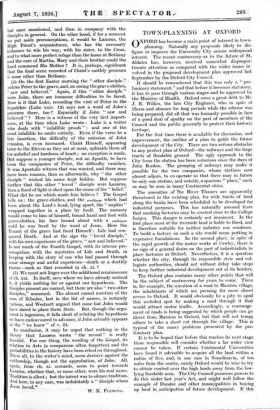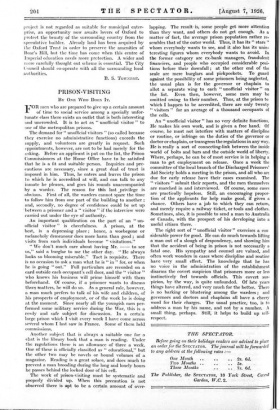TOWN-PLANNING AT OXFORD
tAXFORD has become a main point of interest in town. \-7. planning. Naturally any proposals likely to dis: figure or impiove the University City arouse widespread interest. The recent controversy as to the future of St. Aldates has, however, received somewhat dispropor- tionate attention as compared with the wider issues in volved in the proposed deVelopment plan approved laSt September by the Oxford City Council.
It shmild. be remembered that this was only a " pre- • liminary statement," and that before it becomes statutory, it has to pass through various stages and be approved by the Ministry of Health. Oxford owes a great debt to Mr. J. E. Wilkes, the late City Engineer, who in spite of illness and absence for long periods while the scheme was being prepared, did all that was humanly possible in face of a good deal of apathy on the part of members of the Council and the public generally to protect their historic heritage.
For the fist time there is available for discussion,- and.' improvement, the outline of a plan to guide the future development of the City. There are two serious obstacles to any perfect plan of Oxford—the railways and the large tracts of floodable ground. The ugly approach to the City from the station has been notorious since the days of John Ruskin. The grouping of railways may make it possible for the two companies, whose stations now almost adjoin, to co operate so that there may in future be only one station, and outside, a spacious " place," such as may be seen in 'many Continental cities.
The amenities of she River Thames are apparent! Y threatened in the existing plan, for wide tracts of land along the banks have been scheduled to be developed for industrial purposes. This has naturally aroused fears that smoking factories may be erected close to the College barges. This danger is certainly not imminent. In the first place.most of the riverside land is liable to flood, and is therefore suitable for neither induitry nor residence. . To build a factory on such a site would mean putting in expensive foundations. In the second place, in spite of the rapid growth *of the motor works at Cowley, there to no sign of a general desire on the part of industrialists to place factories at Oxford. Nevertheless, it is a queition whether the city, through its responsible civic and col- legiate authorities, "should , not without delay take steps to keep further industrial deVelopment out of its borders.
The Oxford plan contains many. other, points that will be the subject of controversy for years . to come. There is, for example, the question of a road to Marston village, the inhabitants of which are pressing for more direct access to Oxford. It would obviously be a pity to spoil this secluded spot by. making a road through it that would attract motor traffic. Accordingly, a rearrange. ment of roads is being suggested by which people can go direct from Marston to Oxford, but that will not tempt others to take a short cut through, the village. This is typical of the many problems presented by the. pre- liminary plan..
It is to be hoped that before this reaches its next stage . those responsible will consider whether a far wider view cannot be taken. If certain Continental Universities have found it advisable to acquire all the land within a radius of five, and, in one case in Scandinavia, of ten miles from the centre, surely Oxford would he wise to try to obtain control over the high lands away from the low- lying floodable area. The City Council possesses powers to do thii under last year's Act, and might well follow the example of Dundee and other inunicipalitieS in buying_ up. land in anticipation of future development.If this project is not .regarded as suitable for municipal enter- prise, an opportunity now awaits lovers of Oxford to protect the beauty of the surrounding country from the speculative builder. Already land has been acquired by the Oxford Trust in order to preserve the amenities of Boar's Hill, but the time has come when this centre of Imperial education needs more protection. A wider and more carefully thought out scheme is essential. The City Council should co-operate with all the surrounding local authorities.
B. S. TOWNROE.







































 Previous page
Previous page